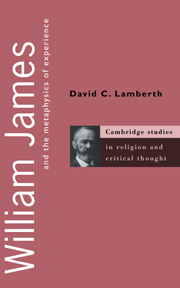Book contents
- Frontmatter
- Contents
- Note on the text
- Acknowledgments
- Introduction
- 1 James's radically empiricist Weltanschauung
- 2 From psychology to religion: pure experience and radical empiricism in the 1890s
- 3 The Varieties of Religious Experience: indications of a philosophy adapted to normal religious needs
- 4 Squaring logic and life: making philosophy intimate in A Pluralistic Universe
- 5 Estimations and anticipations
- Select bibliography
- Index
1 - James's radically empiricist Weltanschauung
Published online by Cambridge University Press: 22 October 2009
- Frontmatter
- Contents
- Note on the text
- Acknowledgments
- Introduction
- 1 James's radically empiricist Weltanschauung
- 2 From psychology to religion: pure experience and radical empiricism in the 1890s
- 3 The Varieties of Religious Experience: indications of a philosophy adapted to normal religious needs
- 4 Squaring logic and life: making philosophy intimate in A Pluralistic Universe
- 5 Estimations and anticipations
- Select bibliography
- Index
Summary
Although William James is best known today for his association with American pragmatism, in the later and most prolific years of his life he was more apt to characterize his central philosophical interest as the advancement of “radical empiricism,” a metaphysical Weltanschauung of his own invention. In the 1909 preface to The Meaning of Truth, James appealed to radical empiricism as the principal justification for his continued concern with the maelstrom of pragmatist and anti-pragmatist warfare, writing:
I am interested in another doctrine in philosophy to which I give the name of radical empiricism, and it seems to me that the establishment of the pragmatist theory of truth is a step of first-rate importance in making radical empiricism prevail.
Although numerous works have taken radical empiricism seriously since James's death, little attention has been devoted to the development of the view in his work prior to the flurry of articles that introduced radical empiricism to James's philosophical contemporaries in 1904–5.
In chapter 2 I seek to redress that oversight, detailing James's turn from psychology to metaphysics in the early 1890s and demonstrating that the bulk of James's metaphysical ideas date, in significantly developed form, from as early as 1895. Before moving to that historical account, in this chapter I offer a relatively brief, systematic analysis of James's radical empiricism in order to provide a basis for the discussions of the rest of the book. My analysis in this chapter is based predominantly on the articles of 1904–5.
- Type
- Chapter
- Information
- William James and the Metaphysics of Experience , pp. 9 - 60Publisher: Cambridge University PressPrint publication year: 1999



